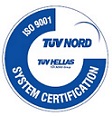Infection Prevention Control
Data on Hospital Infections in Greece
Hospital-acquired infections are among the most common complications of hospitalization. Their consequences are significant, both for patients and for the Greek health system, as they extend patient stays, increase hospitalization costs tremendously, and may result in death.
According to available data, over 10% of hospitalized patients in Greece acquire healthcare-associated infections, resulting in over 3,000 deaths per year. Additionally, hospital-acquired infections increase the length of hospital stays and burden the Greek health system with costs of more than 1.2 billion euros annually.
According to the literature, however, hospital-acquired infections can be reduced significantly or even avoided altogether.
Action taken by CLEO to control and prevent hospital infections
From July 2012 through December 2015, CLEO’s work made waves in the sector of hospital infection prevention and control, resulting in a higher level of hospital care for the pediatric patients at the “Aghia Sophia” and the “Panagiotis and Aglaia Kyriakou” hospitals. CLEO’s activities focused on:
-
Initial CLEO efforts focused on the prevention of hospital-acquired infections and in particular CLABSIs in neonate intensive care, pediatric intensive treatment, and oncology units.
After 6 months of surveillance, CLEO implemented a series of interventions including:
- Briefing staff on the 6-month long surveillance outcomes;
- Implementing training seminars on the proper insertion and use of central vein catheters;
- Developing and distributing training materials, in cooperation with the Nursing School of the National and Kapodistrian University of Athens, on central line insertion and maintenance; and
- Designing an algorithm to diagnose CLABSI precisely.
The application of this series of interventions led to a 28.5% reduction in CLABSIs.
-
The simplest and most effective method of hospital-acquired infection prevention is the implementation of proper hand hygiene practices.
CLEO conducted a prospective two-phase study to assess the efficiency of a simple training intervention, aimed at improving compliance with hand hygiene practices among medical and nursing personnel. Initial surveillance data from thirteen departments selected of the two pediatric hospitals demonstrated low compliance rates (33%). During the second phase of the study, training seminars concerning proper hand hygiene practices were conducted in seven departments, while compliance surveillance continued. Comparative analyses of the two phases showed a substantial increase in compliance within these departments, from 48.3% to 73.9%.
-
SSIs are the second most common hospital acquired infection afflicting adults and children. They have been shown to increase patient morbidity and mortality, as well as hospital care costs.
CLEO conducted a prospective study, in cooperation with the 1st department of Pediatric Surgery of the “Aghia Sophia” General Children’s’ Hospital, aimed at evaluating the effectiveness of a training intervention for PAP administration practices. Initially, practices were recorded and instructions on appropriate PAP administration, including information about the active ingredient and the duration of administration, were developed in collaboration with the hospital’s committee of infections. These instructions were then distributed to the surgeons of this particular clinic. Comparing initial data on PAP practices to data collected after the distribution of instructions, we observed a statistically significant increase in the percentage of the patients receiving the appropriate antibiotic for the right duration, from 6.2% pre-intervention to 77.1% post-intervention.
The results of these activities are encouraging, and have been published in symposia and internationally renowned scientific journals. This work has also garnered popular media attention.






